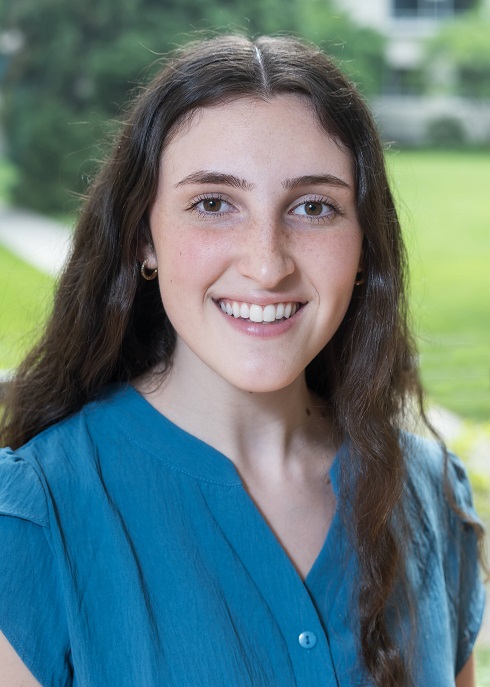
Learning It's Ok to Make Mistakes
June 20, 2025
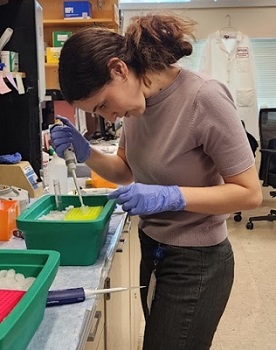 Hi! My name is Alyssa Gunning and I’m a rising junior at the University of Delaware. I am studying Neuroscience with a Pre-medicine concentration and minoring in Disability Studies and Anthropology. All my life I knew science and specifically medicine was the career path for me. Growing up with a brother on the autism spectrum, I quickly grew accustomed to doctors, offices, and medicine. Instead of being turned off to the life of science, I became enamored and wanted to know more about the brain and what caused my brother to be so different. I not only questioned the mechanisms of autism but the entire world around me and would not stop until I knew more answers.
Hi! My name is Alyssa Gunning and I’m a rising junior at the University of Delaware. I am studying Neuroscience with a Pre-medicine concentration and minoring in Disability Studies and Anthropology. All my life I knew science and specifically medicine was the career path for me. Growing up with a brother on the autism spectrum, I quickly grew accustomed to doctors, offices, and medicine. Instead of being turned off to the life of science, I became enamored and wanted to know more about the brain and what caused my brother to be so different. I not only questioned the mechanisms of autism but the entire world around me and would not stop until I knew more answers.
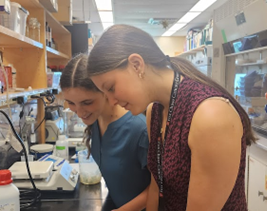 Fast forward to the fall of my sophomore year, I decided to go to Discovery Day at Fox Chase Cancer Center not only to get a free lunch, but also to see if I could really handle a summer (and possibly a life) full of research. While I had some previous experience in labs including a psychology and behavior lab as well as a Neurobiology lab with rat models, I was always given a behind-the-scenes research role with data collection. This fellowship would give me the opportunity to not only truly understand the research I was doing but to also pursue a project of my own with the help of a mentor.
Fast forward to the fall of my sophomore year, I decided to go to Discovery Day at Fox Chase Cancer Center not only to get a free lunch, but also to see if I could really handle a summer (and possibly a life) full of research. While I had some previous experience in labs including a psychology and behavior lab as well as a Neurobiology lab with rat models, I was always given a behind-the-scenes research role with data collection. This fellowship would give me the opportunity to not only truly understand the research I was doing but to also pursue a project of my own with the help of a mentor.
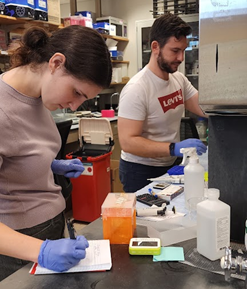 The first week of the fellowship, while extremely demanding, was also very beneficial. I not only learned new techniques I would take with me to the lab but also learned about making mistakes and struggling in the field of science. We spent the week reading challenging scientific papers as well as writing our own protocols. However, with the help of Dr. Purdy and Dr. Austria, we learned how to navigate difficult topics and how to grow, not become discouraged, from our mistakes. This summer I’ll be working in Dr. Wasik’s lab under the mentorship of Dr. Cosimo Lobello. My project will focus on B cell lymphoma and more specifically the expression of ALK protein (anaplastic lymphoma kinase) which promotes cancer cell growth. While there are already some treatments used for lymphomas which express ALK, some cancers have evolved to still survive without the use of this protein. My project will be comparing ALK expressive cancer cells to those who don’t express ALK and trying to figure out differences in biochemical pathways. Throughout the past three weeks, I have not only been growing academically but socially as well. Living and working together with the 2025 Empower cohort has been a great experience filled with fun nights at Rita’s, watching Love Island together, and hiking to explore the beautiful nature around Philadelphia. I’m looking forward to the rest of summer where I hope to gain more confidence in my research and in myself as a future scientist, physician or even both.
The first week of the fellowship, while extremely demanding, was also very beneficial. I not only learned new techniques I would take with me to the lab but also learned about making mistakes and struggling in the field of science. We spent the week reading challenging scientific papers as well as writing our own protocols. However, with the help of Dr. Purdy and Dr. Austria, we learned how to navigate difficult topics and how to grow, not become discouraged, from our mistakes. This summer I’ll be working in Dr. Wasik’s lab under the mentorship of Dr. Cosimo Lobello. My project will focus on B cell lymphoma and more specifically the expression of ALK protein (anaplastic lymphoma kinase) which promotes cancer cell growth. While there are already some treatments used for lymphomas which express ALK, some cancers have evolved to still survive without the use of this protein. My project will be comparing ALK expressive cancer cells to those who don’t express ALK and trying to figure out differences in biochemical pathways. Throughout the past three weeks, I have not only been growing academically but socially as well. Living and working together with the 2025 Empower cohort has been a great experience filled with fun nights at Rita’s, watching Love Island together, and hiking to explore the beautiful nature around Philadelphia. I’m looking forward to the rest of summer where I hope to gain more confidence in my research and in myself as a future scientist, physician or even both.
Building Confidence in Research
July 7, 2025
I can’t believe we're more than halfway through! At this point in time, I feel like I’m truly getting better at research day by day. At the beginning, it seemed impossible for me to be performing any protocols or experiments on my own. I wasn’t even sure I'd understand my project. However, thanks to my mentor I’ve been able to grasp epigenetic concepts and even start questioning things on my own!
Throughout the past two weeks I’ve also made many mistakes and witnessed ‘failures’ in the lab. One instance in particular, I knocked over a whole tray of western blot membranes and lost about 10 antibodies! While I thought this was the end of the world, my mentor had no reaction and moved on like nothing occurred! I learned from this event that mistakes happen all the time and everything can be redone.
Moreover, I’ve begun to take care of three cell lines by myself. This is an essential part of my project because I’m using one ALKi (ALK inhibitor) sensitive line and two ALKi resistant lines to compare different proteins expressed. I’ve learned the hardships of keeping up with cell lines, such as feeding them the right amount of media but coming back from the weekend with a flask of dead cells. While this has definitely been a challenging task, it's the most rewarding when the cells stay alive because I can start performing actual experiments on them.
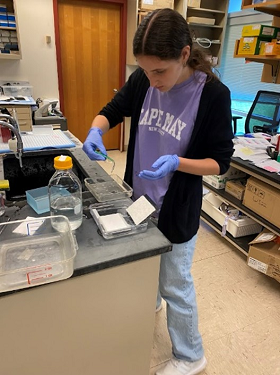 At this point in the lab, I’ve completed about 5 western blots from start to finish. I even have started to teach another student who has joined the lab. It's awesome to see how much I’ve grown from not knowing what a western blot was (6 weeks ago) to now being able to perform multiple all by myself. We have also been able to narrow down two important proteins which play a role in gene expression within the ALKi resistant cell lines. To be more specific, we are looking at the methyltransferases EZH2 and G9a. We will be using protein inhibitors as well as protein degraders to see what occurs in the cells when those important epigenetic players are taken out of the equation (hopefully cell death).
At this point in the lab, I’ve completed about 5 western blots from start to finish. I even have started to teach another student who has joined the lab. It's awesome to see how much I’ve grown from not knowing what a western blot was (6 weeks ago) to now being able to perform multiple all by myself. We have also been able to narrow down two important proteins which play a role in gene expression within the ALKi resistant cell lines. To be more specific, we are looking at the methyltransferases EZH2 and G9a. We will be using protein inhibitors as well as protein degraders to see what occurs in the cells when those important epigenetic players are taken out of the equation (hopefully cell death).
Outside of the lab, I have been able to grow professionally and socially. Throughout the fellowship, I’ve attended a LinkedIn workshop which taught me the importance of networking as well as a scientific career workshop where we learned how to gauge our strengths and weaknesses in a scientific career. Moreover, I’ve been able to spend time with other fellows through group movie nights and visiting their labs. This weekend we are even planning to attend the Chinese lantern festival! I’m so grateful for this fellowship introducing me to the amazing other fellows and also for allowing me to grow in so many ways!
Saying Goodbye to an Amazing Summer
August 9, 2025
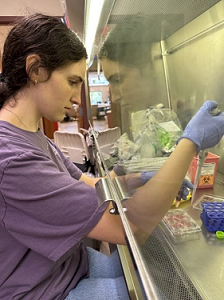 I can’t believe we're already at the end of the summer! Time surely does fly by! It's hard to believe that 10 weeks ago I had never heard of a western blot or thought I'd never understand any part of epigenetics!
I can’t believe we're already at the end of the summer! Time surely does fly by! It's hard to believe that 10 weeks ago I had never heard of a western blot or thought I'd never understand any part of epigenetics!
This summer at Fox Chase really allowed me to grow my professional self while making amazing friends along the way. From career building seminars to grad school applications, I’ve had the chance to lay out plans for every step of my future and feel more secure in my goals.
Within the lab, I’ve been able to grow alongside my mentor who has not only seen me make many mistakes but most importantly taught me how to fix them and move on after. This summer, I focused on Anaplastic large cell lymphoma with ALK (anaplastic lymphoma kinase) positive subtype. This subtype makes up a high percentage of pediatric lymphomas and currently utilizes chemotherapy and ALK inhibitors as therapy. However, resistance to ALK inhibitors has occurred to about one-third of patients getting treatment. This summer, we questioned if there was an alternative protein required for survival that we could target to treat resistant cells.
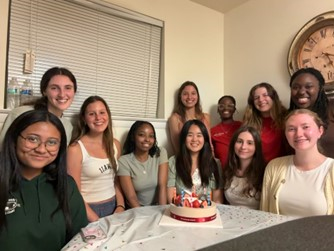 To study this, I learned and practiced using MTT assays, western blots, qPCR, and tons of work with cells. We used MTT assays to test a variety of drugs inhibiting methyltransferases, also known as gene regulators, which are thought to play an important role in ALK+ cancer survival. After we saw positive results from inhibiting a protein called SUV39H1, we quantified the amount of protein in ALK+ cells using western blots. Last, we checked the levels of RNA from the regulated genes using qPCR. Overall, I not only learned the steps of performing techniques but the meaning behind each one. Towards the middle of the summer, I found myself asking more and more questions pertaining to our question and getting excited over results. My biggest takeaway would be learning how to question everything in science and exploring different techniques until you get an answer.
To study this, I learned and practiced using MTT assays, western blots, qPCR, and tons of work with cells. We used MTT assays to test a variety of drugs inhibiting methyltransferases, also known as gene regulators, which are thought to play an important role in ALK+ cancer survival. After we saw positive results from inhibiting a protein called SUV39H1, we quantified the amount of protein in ALK+ cells using western blots. Last, we checked the levels of RNA from the regulated genes using qPCR. Overall, I not only learned the steps of performing techniques but the meaning behind each one. Towards the middle of the summer, I found myself asking more and more questions pertaining to our question and getting excited over results. My biggest takeaway would be learning how to question everything in science and exploring different techniques until you get an answer.
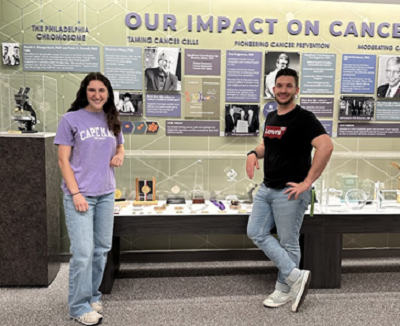 Yesterday, we were able to show off everything we learned at the end of summer symposium. While the build-up was terrifying, everyone wound up stepping up to the challenge and doing an amazing job. At the beginning of the summer, I didn’t think it was possible to get up in front of staff, friends, and family to talk about science by any means. However, the symposium turned out great and I even found myself enjoying the presentation while behind the podium. I not only learned to build my confidence in presenting but to embrace the opportunities that sound terrifying at first.
Yesterday, we were able to show off everything we learned at the end of summer symposium. While the build-up was terrifying, everyone wound up stepping up to the challenge and doing an amazing job. At the beginning of the summer, I didn’t think it was possible to get up in front of staff, friends, and family to talk about science by any means. However, the symposium turned out great and I even found myself enjoying the presentation while behind the podium. I not only learned to build my confidence in presenting but to embrace the opportunities that sound terrifying at first.
The empower fellowship has really been the best opportunity I could've taken. I have not only been able to explore basic research and what a life in that entails, but the whole spectrum of science/healthcare careers. I also left with so many meaningful connections, professionally at work and socially with all the amazing other fellows. I’m so thankful to those who believed in me enough to offer this opportunity and those who believed in me and offered assistance along the way.